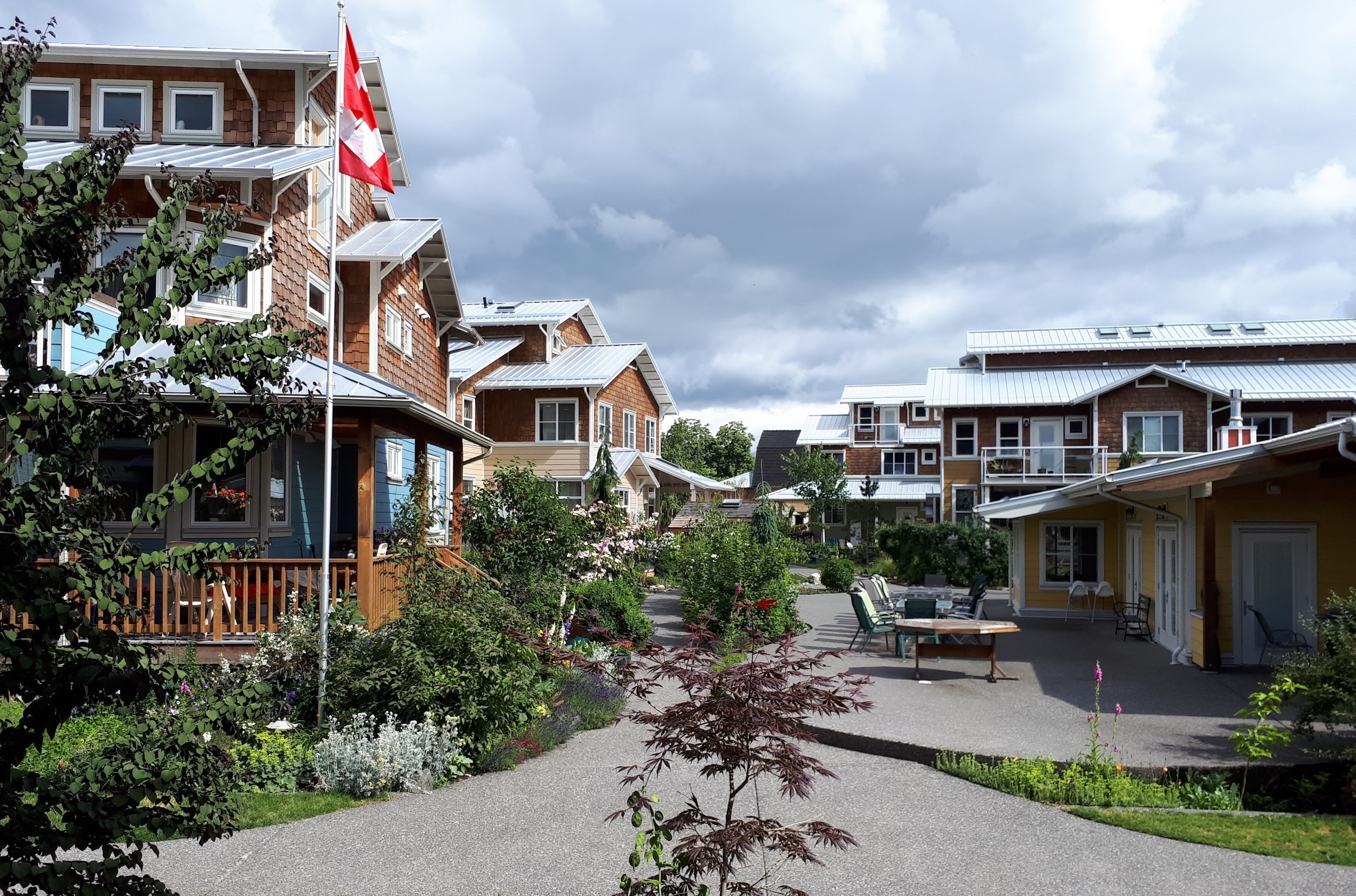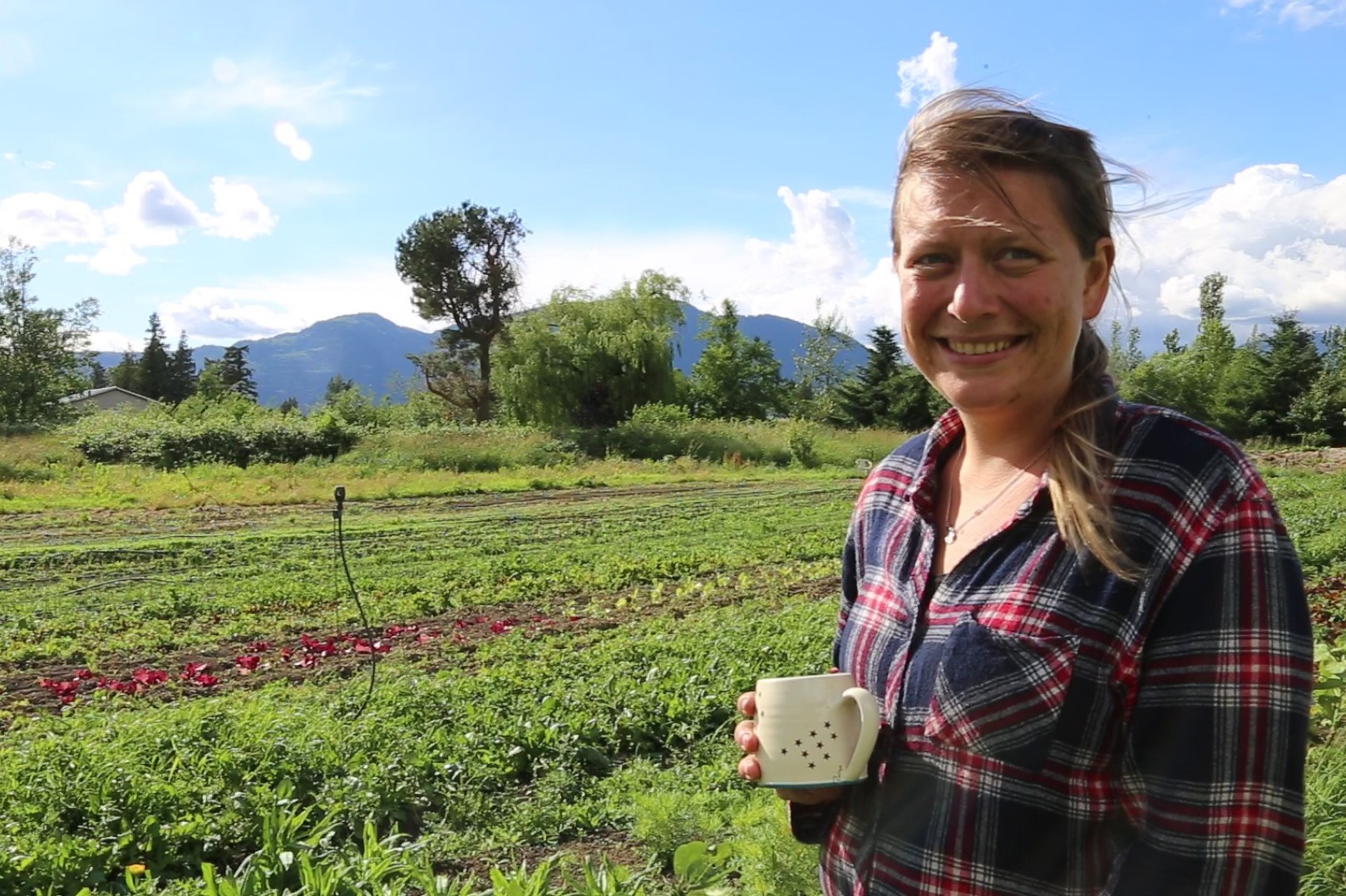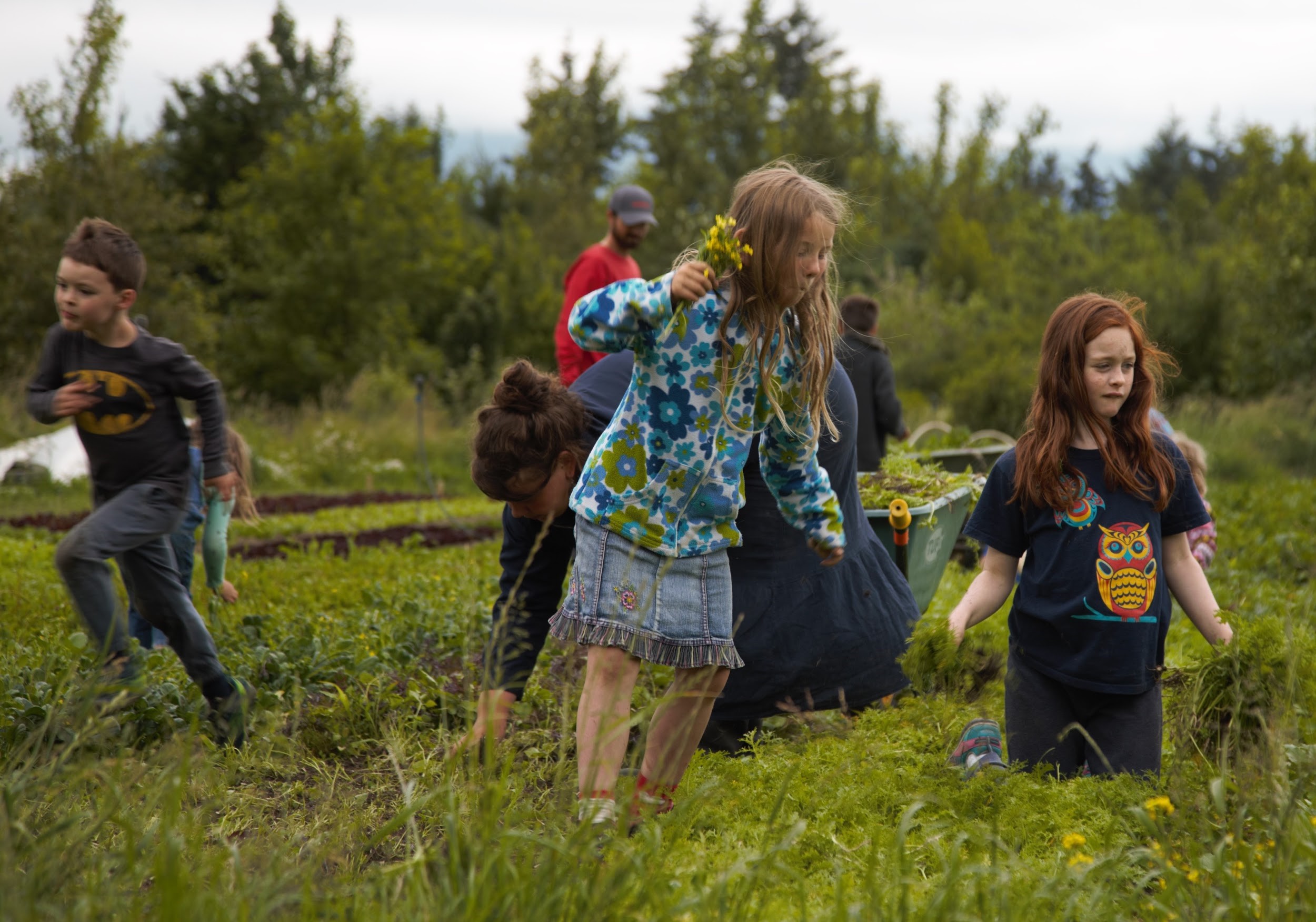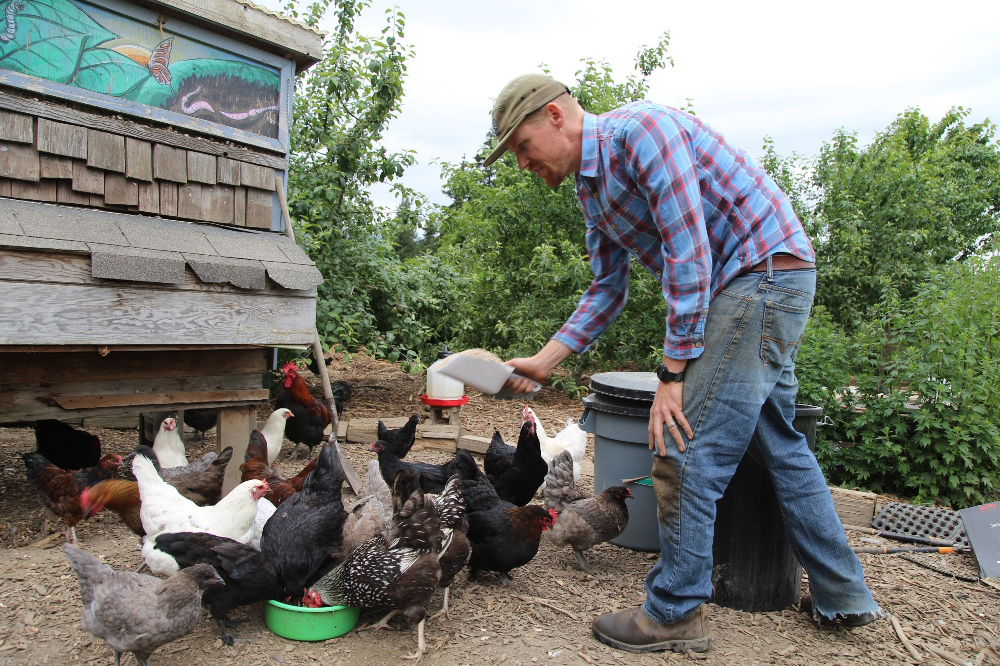I arrive at the Yarrow Ecovillage on one of those days when the sky is in constant flux, the clouds above shifting restlessly in the cool wind, creating new patterns against the blue sky. I walk past the cluster of colourful co-housing buildings, down a long dirt path speckled with puddles heading back to the 20 acres of agricultural land. I find farmer Shane Rozeveld in the middle of constructing a new cooler for his produce. He has never built a cooler before, but tenacity and YouTube have been his guides.
Rozeveld is one of approximately 100 residents who call the Yarrow Ecovillage home. The village, located within the small town of Yarrow in Chilliwack, B.C., is technically a strata, meaning that the residents own the area of land their personal unit sits on but share the common spaces and agricultural land. Decisions involving those shared assets are made using a consensus system.
As we tour the grounds I discover that the back acreage is composed of numerous plots farmed by different residents of the village, that there is a food forest and a beekeeping operation and a small orchard of chestnut trees. I discover that Roosevelt has a master’s in divinity and that his favourite place on the property is a small pond tucked into a grove of trees with a trout-bearing stream running through it. We see several greenhouses and chicken coops, a small barn and a washing station that the farmers share.
This model — shared cohousing and shared farm land and infrastructure — has enabled Rozeveld to return to the fields after farming skipped a generation in his family. He remembers hearing about his grandfather’s experience and realizing he still had the chance to learn from him.
“He spent his whole life on the farm. By three or four years old, his parents would send him out the door to stand in the roads to keep the cattle in the fields. It was truly inspiring to realize I still have that rich knowledge available to me. I don’t want to miss that opportunity to tap into what my grandparents had.”
Canada needs young people like Rozeveld to return to farming. According to the most recent Stats Canada farm census, the majority of Canadian farmers are between 55 and 59 years of age, and 92 per cent don’t have a succession plan.
It’s not a lack of interest in farming that keeps young people out of the fields; instead lack of available land and exorbitant start-up costs are among the barriers new entrants to farming face. Land-share projects, like the one modelled at the Yarrow Ecovillage, may be part of the solution to the food security threat produced by an aging farming demographic.

A changing agricultural landscape
Rozeveld is part of a growing trend of young people interested in farming. That same Stats Canada farm census shows a small but statistically significant increase in farmers under the age of 35.
Darcy Smith, who matches aspiring farmers with available land in Metro Vancouver and Fraser Valley for the Young Agrarians — a resource network for new and young farmers, explains that nearly two thirds of new entrants into agriculture do not come from a traditional family farming background. They tend to be attracted to farming, she says, for largely ideological reasons.
“It’s the opportunity to farm using ecological practices, the opportunity to support local food systems, to contribute to their community [that is attracting new farmers]. Some people are coming out of bachelor's or master’s degrees in politics or international relations and saying, well, I feel like I can make a much more direct impact in my community and in the world if I grow food instead of working in this other field.”
The challenge of entering farming this way is that they don’t have the same supports as someone coming from a traditional family farming background. They don’t have the same access to land, or capital or the knowledge base that comes from growing up on a farm.
The Young Agrarians arose as a grassroots way to address those barriers. The organization matches new farmers with available farmland for lease, connects them with experienced farmers who are willing to share their knowledge and expertise and supports them in business-planning to ensure the farms are financially viable. Since its formation in B.C. in 2012, The Young Agrarians has grown to include locations in Alberta and Ontario.
An entry point for new farmers
The Yarrow Ecovillage reduces some of the financial barriers to entering farming. The co-housing units are affordable, and rental units are available. Residents at the village have access to the agricultural land for a small fee ($500 a year) and sharing infrastructure, land and equipment reduces the start-up cost for new farmers. Farmers who are already established on the land are also available to share their knowledge of soil conditions and organic pest control.
Miranda Chiasson, another young farmer at the Yarrow Ecovillage, can’t imagine getting started in farming without this kind of support.
“Just to think of leasing two acres in the back of Chilliwack somewhere just being like, ‘well best of luck!’ That sounds impossible,” she says. “I can't fathom how I would have been able to start my own semi-solo operation without first working for farmers who are here and learning the system and learning the soil.”
After moving to the village, Chiasson worked for other farmers on the land for a year before starting her own operation. She now farms several plots and earns her living entirely from their produce.
I asked Smith whether the Yarrow Ecovillage model presents a solution for new farmers struggling to enter the field. She says the ecovillage model is one example of land-sharing, and that land-sharing models are essential to the future of farming.
“As land prices soar and there are more and more of us and hopefully more people who want to start farming, we're going to need to look at shared models of land access. I think the ecovillage model is one example, there are also cooperatives, shared landownership. Leasing is a shared land-access model. There are a number of challenges with bureaucratic and regulatory around this, but I think where there's a will there's a way.”

One of the issues is that while many new farmers are leasing or sharing land, regulations still favour the family farm model. That means residential structures on the property are limited and many new farmers must commute to the fields. Chiasson says that for her a commute would have meant the difference between farming and not farming.
“It feels like the gamechanger for me. Being able to live where I work has made it possible to farm for sure. I wouldn't be able to be a single parent and a farmer if I wasn't living on site.”
Government regulations need to adjust
I asked Lana Popham, B.C.’s minister of agriculture, about regulatory barriers to land-sharing. This is one of the things, she says, that the ministry is looking into. Having farmed herself before getting into politics, she says she watched with concern as the Ministry of Agriculture slowly eroded over the past 10 years. She says she has plans to set things right again.
“The best part about being the agriculture minister right now, in my view,” says Popham on the phone from Victoria, “is that we see this whole new energy with younger people wanting to be more involved in their food systems. And that energy is great, but we've still got those barriers in place. For example, the cost of farmland is an absolute barrier for people to get into farming.”
She says that land-sharing or co-op models present a solution to the financial barriers, and in order to support the resurgence of interest in these models, the ministry will work with the Co-op Association of B.C. to update the manual for starting a co-op.
It will also be partnering with The Young Agrarians to support its initiatives and assisting new farmers in value-adding — producing commercial products like blueberry pies for blueberry farmers and beer for barley farmers in addition to the primary agricultural product — to make small-scale operations more economically viable.
Helping farmers get set up for value-adding is part of the Grow B.C. program, which will also include creating a large food innovation centre in the province to attract research and development funds and smaller food hubs distributed throughout the province to make it accessible to farmers across the region.
Popham says that allowing co-housing alongside prime agricultural land may be an option to enable farmers who are land-sharing to live where they farm, but these decisions must be made by local governments.
“There's a lot of potential, and almost every municipality or regional district is starting to really focus in on an agricultural plan at the local level. It’s possible to map [new models] onto the agricultural land reserve if they're modelling this in agricultural land,” she says.
Still, new models will only receive approval if agriculture remains the primary use — any structural additions will need to serve that purpose.
While the Agricultural Land Reserve has been crucial to protecting prime farmland in the region, Popham says it’s time to review the regulations.
“It's old, old legislation, and it's never been looked at as a whole for the entire time that it's been enacted. There have been little tweaks here and there and, in my view, those tweaks that have been done over the last 10 years have eroded it.”

Reviewing the Agricultural Land Reserve
Popham says an independent committee has been set up to review the ALR and the Agricultural Land Commission — the administrative tribunal responsible for regulating land use in the ALR — and she expects the committee will look for solutions to issues like the mega mansions on farmland in Richmond that make the land unaffordable for farming.
Jennifer Dyson, chair of the Agricultural Land Commission, says it’s too soon to know what those solutions might be. The review is still in the very early stages and the report won’t be ready until the fall.
I asked Dyson whether current ALR regulations are conducive to co-ops. She says there is no restriction on sharing land, but the residential structures permitted on agricultural land are strictly regulated. Allowing co-housing to facilitate land-sharing practices on agricultural land would never be permitted across the board.
The restrictions against housing are to prevent development that would go against the commission’s mandate to preserve farmland for generations to come. But this doesn’t mean the commission is closed to new models of farming. Dyson says they will consider all applications for changes to agricultural land on a case-by-case basis.
“Rules exist because someone has taken advantage of a system. The commission is all about encouraging agriculture, and if there's a really cool approach to it, we're about it. But let's see some agriculture first.”
Dyson says applications for additional housing for farmers who are land-sharing are more likely to gain approval if the farmers can show that they’re actively farming the land and capable of achieving productive capacity.
“If the plan is to build it and then to do agriculture, we want to flip it and say let's do agriculture and then you have a really good understanding of what you're getting into and let's find a way to make it happen so that you can work together to do it.”
The Yarrow Ecovillage model isn’t just about farming, it’s also about low-impact housing development, and only a small percentage of the inhabitants actually farm. This has led Rozeveld and others to question whether the operation actually constitutes an ecovillage.
“We’ve moved more towards the co-housing side of things,” Rozeveld says, “and there are residents who aren’t here for environmental reasons.”
Still, the village has enabled farming for the few that take advantage of it. For this model to be effective on prime agricultural land, however, would require that co-housing be built only for as many residents as are needed to reach the maximum productive capacity of the land.
Shifting mindsets
Darcy Smith from the Young Agrarians explains that the novelty of land-sharing models can act as a barrier. There needs to be a shift in understanding of what farming is.
“I think the general concept of accessing and farming land in community is becoming more widespread, but it is new to some people who might be the ones administering mortgages or approving applications, so being able to explain those and shift the understanding of farming and farming communities is important.”
With a growing focus from consumers on supporting local and buying organic, small-scale farming start-ups and the land-sharing models that support them have the opportunity to be more viable than ever. Agriculture Minister Popham says she sees the opportunity and is committed to supporting the shift.
“There's so much that can be done,” she says, “and consumers are fully in on it — this is a moment we've been waiting for. I feel like with agriculture, there's been a real lull for a couple decades and now we’ve got an opening that we really have to embrace before it closes, and young and new farmers are part of that movement.” ![]()
Read more: Energy, Environment
















Tyee Commenting Guidelines
Comments that violate guidelines risk being deleted, and violations may result in a temporary or permanent user ban. Maintain the spirit of good conversation to stay in the discussion.
*Please note The Tyee is not a forum for spreading misinformation about COVID-19, denying its existence or minimizing its risk to public health.
Do:
Do not: